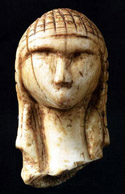Anthropology, Department of

Department of Anthropology: Faculty Publications
Document Type
Article
Date of this Version
December 2007
Abstract
Human behavioral ecologists have shown that the reproductive lives of women are affected by both their husbands and the grandmothers of their children. Study of the combined effect of the roles of the husbands and mothers of 650 Khasi women aged 16–50 years supports the ideas that the reproductive agendas of husbands may require more than women want to invest and that mothers provide support and protective services to their daughters and grandchildren. In the absence of the woman’s mother, the husband’s agenda appears to have more influence on her reproductive career. In a cooperative vein, women’s mothers may contribute to good marital choices. A view of reproductive pursuits that incorporates in-laws enhances behavioral ecology approaches to the evolutionary comprehension of human reproductive behavior. This view also more readily interfaces with the cultural systems that set up the ecologies of reproductive life.
The article is followed by 11 sets of comments and a response by the 3 original authors.


Comments
Published in Current Anthropology, Volume 48, Number 6, December 2007, pp. 861-890. Copyright (c) 2007 by The Wenner-Gren Foundation for Anthropological Research. Published by the University of Chicago Press. Used by permission.